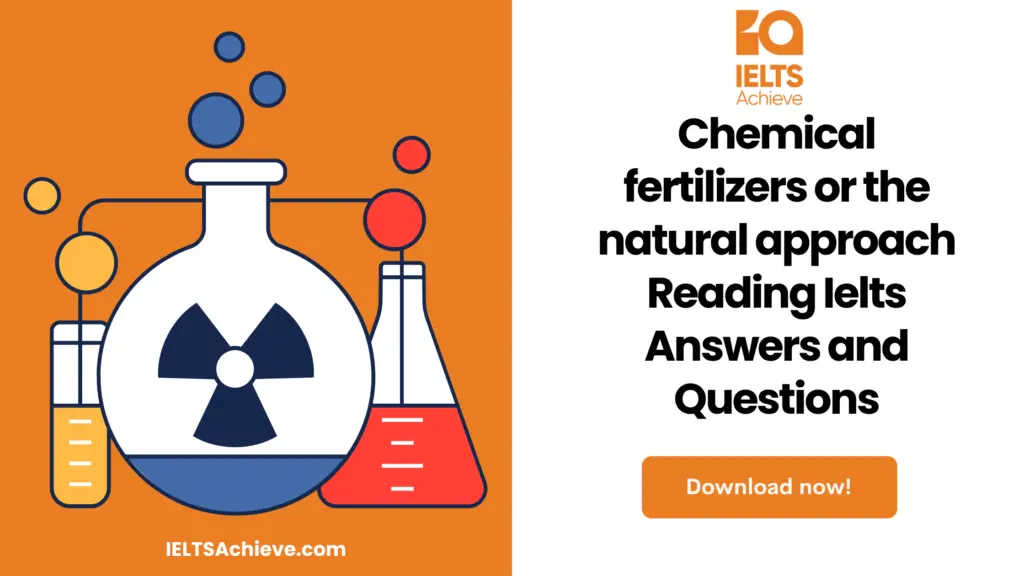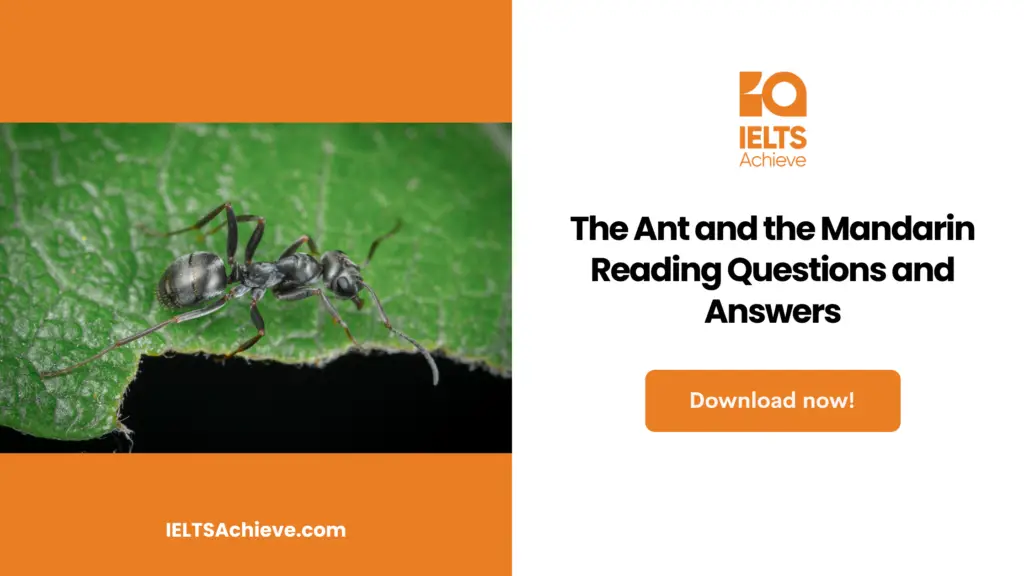The Blog post contains the following IELTS Reading Questions
- IELTS Reading Locating Information questions.
- IELTS Reading Yes No Not Given questions.
- IELTS Reading Short Answer Questions.
Stay informed and prepared for success – Explore our comprehensive Reading Test Info page to get valuable insights, exam format details, and expert tips for mastering the IELTS Reading section.
IELTS Reading Passage – chemical fertilizers or the natural approach

Chemical fertilizers or the natural approach
The global population continues to increase. In addition, despite the expansion of high-tech agriculture, 800 million people go hungry. Clearly, it is time to reconsider the origins of the food we consume. It will require more than the same old farming techniques to feed 9 billion people, especially if we want to do so without chopping down rainforests and planting every single patch of prairie. Finding food for all these people will test the farmers’ and scientists’ resourcefulness to the limit. Yet, irreplaceable aquifers that provide irrigation water for some of the world’s most productive farmlands are either drying up or filling with seawater, and arable land in China is disintegrating, causing massive dust storms that redden sunsets as far away as North America. “In fifty years, agriculture must become the solution to environmental concerns. Kenneth Cassman, an agronomist at the University of Nebraska-Lincoln, asserts, “We’re in trouble if we don’t have systems that improve the environment, as opposed to merely defending it.” This sentiment was mirrored in January by the Curry report, an examination of the future of British agriculture and food.
It is simple to assert that agriculture must improve, but what should the farming of the future look like? At this moment, concerned consumers face what appears to be an ever-widening ideological divide. In one corner are techno-optimists who believe in genetically modified crops, improved agrochemicals, and computer-enhanced machinery; in the other are proponents of organic farming, who reject artificial chemicals and embrace back-to-nature practises such as composting. Both sides use credible evidence to support their claims to the moral high ground, and both bring sufficient passion to the argument for many people to conclude that we are forced to choose between two mutually incompatible alternatives.
Not so. When ideological blinders are removed and the question of how the world can produce the food it needs at the lowest environmental cost is posed, a new middle ground emerges. The key is sustainability: whatever we do must not deplete the soil and water capital we require to continue producing. Future intelligent agriculture, like organic agriculture now, should pay far greater attention to the health of its soil and the ecosystem it is a part of. But intelligent agriculture should also employ chemical fertilisers and pesticides in a wise and regionally relevant manner. In this new style of agriculture, information on what is happening in each field and how to respond is more important than chemicals. Nonetheless, this crucial feature may be the most disregarded nowadays.
Clearly, organic agriculture has all the positive emotions on its side. A method that eschews synthetic chemicals poses no risk of soil and water contamination. And its emphasis on strengthening natural ecosystems appears to be beneficial for everyone. Perhaps these simple assumptions explain why organic food sales in Europe are expanding at least fifty percent annually.
Going organic sounds nice, but it is also indigenous. Organic agriculture has its own set of environmental consequences that may be worse than those of conventional agriculture, particularly if it were to become the global standard. Moreover, the organic vs chemical debate focuses on the incorrect question. The issue is not what you put into a farm, but what you get out of it in terms of crop yields and pollutants, as well as the state of the land when you’re finished.
Consider chemical fertilisers, which provide nitrogen, an important plant nutrient, as well as phosphorus and potassium to crops. The notion that artificial fertilisers are unwholesome and that plant nutrition must originate from natural sources is a credo of organic agriculture. In contrast to other types of fertilisers, however, chemical fertilisers cause the most damage to the environment through the emission of greenhouse gases, such as carbon dioxide from the fossil fuels used in their production and nitrogen oxides from their deterioration. In addition to excess nitrogen from chemical fertilisers, excess nitrogen from organic manures can also damage groundwater.
On the other hand, it is detrimental to rely entirely on chemical fertilisers to give soil nutrients without taking further steps to maintain healthy soil. Organic farmers do not use synthetic fertilisers, thus they are experts at increasing soil fertility through strategies such as working crop wastes and manure into the soil, rotating grain with legumes that fix atmospheric nitrogen, and other methods.
This generates essential soil nutrients and also enriches the soil with organic matter, making it more retentive and hospitable to the crop’s roots and organisms such as earthworms that maintain soil fertility. This soil also retains water more effectively, allowing for more efficient use of both precipitation and irrigation water. And organic matter binds CO2 in the soil, which helps to offset fossil fuel emissions and mitigate global warming.
Proponents of organic agriculture are quick to point out that farms handled in this manner can provide yields that are comparable to areas fertilised with synthetic fertilisers. Bill Liebhardt, research manager at the Rodale Institute in Kutztown, Pennsylvania, recently collated the results of similar studies for corn, wheat, soybeans, and tomatoes in the United States and found that organic fields averaged yields between 94% and 100% of surrounding conventional crops.
However, this hopeful depiction only provides half the story. If farmers wish to preserve or increase soil nutrients without the use of synthetic fertilisers, they cannot cultivate such crops annually. Alternate with soil-building crops like pasture grasses and legumes like alfalfa. Therefore, the yield of staple cereals such as wheat, rice, and corn must decline with time. This is the greatest expense of organic agriculture. Vaclav Smil of the University of Manitoba in Winnipeg, Canada, thinks that global grain production would decrease by at least half if farmers stopped using the 80 million tonnes of synthetic fertilizer they use annually. Either farmers would have to treble the amount of land they cultivate, at catastrophic expense to natural habitats, or billions of people would perish from hunger.
This does not imply that farmers could not survive with less fertiliser. Technologically advanced farmers in affluent nations, for example, can now measure their yields hectare by hectare or even more precisely across a vast area. Instead of responding to average conditions, they can target their fertiliser to the areas of the field that will benefit the most. This boosts production and reduces fertiliser consumption. Agronomist Ron Olson of Cargill Fertilizer in Tampa, Florida, predicts that farmers will eventually incorporate long-term weather forecasts into their planning so they can reduce fertiliser use when the weather is anticipated to result in bad harvests.
Using organic methods has several advantages, especially for impoverished farmers. However, stringent “organic agriculture,” which forbids certain technology and permits others, is not always more environmentally friendly. Consider herbicides as an example. These substances can leak into streams and poison wildlife and humans. Researchers at the University of California, Berkeley, led by Tyrone Hayes discovered just last month that even low amounts of atrazine, the most widely used weedkiller in the United States, can inhibit the correct development of frog tadpoles.
Unlock your full potential in the IELTS Reading section – Visit our IELTS Reading Practice Question Answer page now!
Recommended Questions:
Renewable Energy IELTS Reading Question with Answer
Chemical fertilizers or the natural approach IELTS reading questions
Questions 1-4
Use the information in the passage to match the people (listed A-D) with opinions or deeds below. Write the appropriate letters A-D in boxes 1-4 on your answer sheet.
- Vaclav Smil
- Bill Liebhardt
- Kenneth Cassman
- Ron Olson
- By incorporating weather data, the use of chemical fertilizers can be optimised.
- The yield of organic farming is roughly equivalent to that of a regular frame.
- A better agricultural environment is a vital key to solving environmental problems.
- If all farmers stopped using synthetic fertiliser, there would be significant production losses.
Questions 5-9
Do the following statements agree with the information given in Reading Passage 1? In boxes 5-9 on your answer sheet, write
YES if the statement agrees with the information
NO if the statement contradicts the information
NOT GIVEN if there is no information on this
5. Increasing population, dwindling irrigation, and declining soil force the agricultural economy to its breaking point.
6. Farmers have only two options: artificial fertiliser or a natural way.
7. At the moment, chemical fertiliser is more expensive than natural fertiliser.
8. Organic farmers must alternate planting methods in order to preserve nutrients in the soil.
9. “Organic agriculture” is the method by which all environmentally destructive technologies are absolutely prohibited.
Want to excel in identifying the writer’s views and claims? Click here to explore our in-depth guide on how to accurately determine Yes, No, or Not Given in the IELTS Reading section.
Questions 10-13
Complete the following summary of the paragraph of Reading Passage Using NO MORE THAN TWO WORDS from the Reading Passage for each answer.
Write your answers in boxes 10-13 on your answer sheet.
Several 10……………………. techniques must be used to ensure that the global population does not go malnourished. A team called 11……………………… confirmed the viewpoint of a scholar through a survey in British farming. These days, more and more European farmers believe in 12……………………….. farming. The organic versus 13……………………….. argument appears to be incorrect.
Unlock your full potential in the IELTS Reading section – Visit our IELTS Reading Practice Question Answer page now!
Recommended Questions:
Renewable Energy IELTS Reading Question with Answer
Chemical fertilizers the natural approach Reading Answers
1. D
2. B
3. C
4. A
5. YES
6. NO
7. NOT GIVEN
8. YES
9. NO
10. FARMING
11. CURRY
12. NATURE/ORGANIC
13. CHEMICAL

We hope you found this post useful in helping you to study for the IELTS Test. If you have any questions please let us know in the comments below or on the Facebook page.
The best way to keep up to date with posts like this is to like us on Facebook, then follow us on Instagram and Pinterest. If you need help preparing for the IELTS Test, join the IELTS Achieve Academy and see how we can assist you to achieve your desired band score. We offer an essay correction service, mock exams and online courses.


